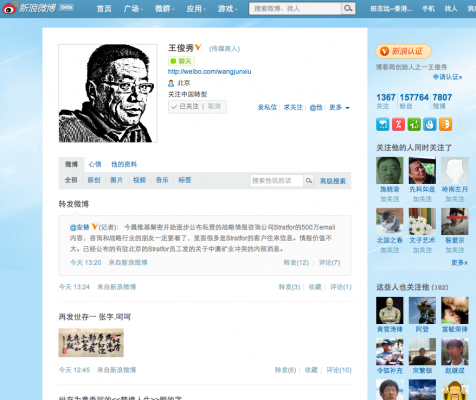The following post by Wang Junxiu (王俊秀), one of the founders of the blog platform Bokee.com and a well-known Chinese internet pioneer, was deleted from Sina Weibo sometime before 2:16pm Hong Kong time today, February 27, 2012. Wang Junxiu currently has more than 157,000 followers, according to numbers from Sina Weibo. [More on deleted posts at the WeiboScope Search, by the Journalism and Media Studies Centre].
Wang’s post is a repost of a pair of posts by scholar Li Qingzhen (李清振) and Sina Weibo user “Shenzhen Lawyer” (法律资讯-文史典故).
Both of the posts concern a video recently surfacing on China’s internet in which Hu Dehua (胡德华), the third son of Hu Yaobang (胡耀邦), the former General Secretary of the CCP who pioneered reforms under Deng Xiaoping in the 1980s — and whose death on April 15, 1989, helped to fuel student protests in China leading up to the Tiananmen massacre that June.
In the video, shown here as having been deleted, Hu Dehua says of his father: “The difference between him, Dad, and Old Deng was that one cared about saving the people and the other cared about saving the Party. After the Cultural Revolution ended, everything was stagnant and saving the people and Party were one and the same thing. Later, after all stomachs were full, people started having other demands, wanting the power to voice [their own demands]. Hu Yaobang believed people should always have a place to speak, that the freedom and power to speak were necessary. But Old Deng only permitted people to say the Party was good. Saying the Party was bad was not OK . . . So the first 10 years of reform were very different from the 20 years that followed.”
//@TeacherLiQingzhen: This sentence by Hu Dehua hits the nail on the head about two different kinds of reform over the past 30 years. //@ShenzhenLawyer: He Dehua talking about reform: [Is it about] saving the Party or saving the people?
The original Chinese-language post from Wang Junxiu follows:
//@李清振老师: 胡德华这段讲话,一语道破过去30多年两种不同的改革观。//@法律资讯-文史典故: 胡德华谈改革:救党还是救民

NOTE: All posts to The Anti-Social List are listed as “permission denied” in the Sina Weibo API, which means they were deleted by Weibo managers, not by users themselves.




















